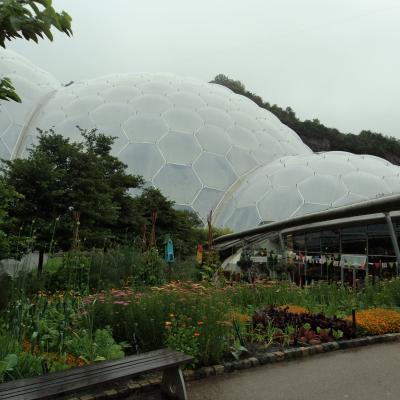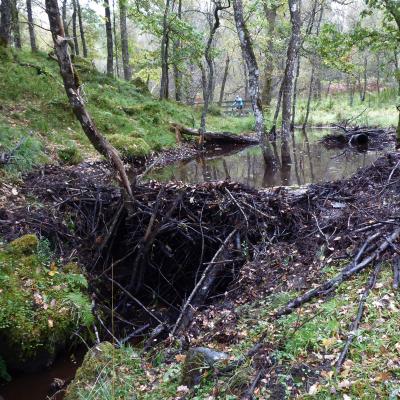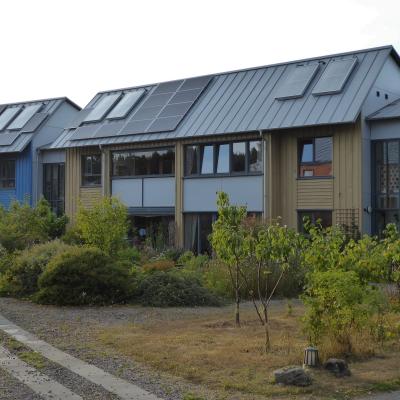My experience of trialling an electric bikes for a week's holiday during covid lockdown. Read on to see where we went, our experience of the bikes, the environmental impact and a few technical details.
Day 1: Tim and Dave from Dunblane Development Trust showed my wife and I our bikes then took us for a test 'spin' round the local streets. First impression - heavy, but zippy up hills. My wife and I then cycled round our local countryside on the back roads, generally sticking to 'eco' mode or even switching the electric power off! As regular cyclists, this power boost feels like cheating!
Day 2: Headed east from Dunblane to Braco and Gleneagles. Overtook some regular cyclists on the first hill, but rather than 'gloating' I felt a bit embarrassed. Will have to get over this! Stopped for a picnic coffee in amidst the whisky barrels of Tullibardine Distillery, then enjoyed the power 'normal' for the hilly Sheriffmuir road on our return. The bikes come into their own on up hills and against the wind. On the flat and downhill, the motor power is restricted to 15.5mph so they are of limited benefit.
Day 3: A longer day cycle across the Carse of Stirling, to Fintry. Although we have lived in this area for 30 years we discovered some interesting new back roads with no traffic, and some potholes. Saw buzzards and a stoat and the windfarm above Fintry - one turbine is owned by the local community. Did 46 miles, with 38% charge remaining albeit we used 'eco' most of the way out, then more power as we got tired on the way back. Back home, recharging takes less than 3 hours.
Day 4: Rather saddle sore from yesterday, so I am sorry to say, we reverted to using a car (4 people) to go for a walk in the Stirling countryside.
Day 5: 43 miles, Dunblane to Braco, past Muthill, River Earn, Comrie and return. Watched buzzards and red kites soaring above us and lenticular clouds against a blue sky. Used 'eco' on the flat and 'normal' mode up hills which made the cycle easier than day 3.
Day 6: Afternoon cycle along the old railway line to Doune, then up towards the Doune windfarm. Walked up to the turbines - a magnificent sight close up. Superb views to snow patches on Ben Ledi and the Ochills. Used 'high' mode for the first time on the steep ascent - there is no way I would come here on a pedal bike.
Day 7: 38 miles today. Did my pre-covid commute Dunblane to Stirling in 27 minutes - exactly the time I used to take on my pedal bike! Of course, today I arrived without sweating, and the electric bike will be quicker on the way home with more up hill. So, on the flat the electric bike is no faster than a pedal bike, and is annoyingly heavy. The only advantage would be if there is a head wind. Continued past Cambusbarron and over the high moorland road to Carron Valley - another route I would normally avoid.
The Environment:
In our case, we had a week's holiday, and normally we would drive somewhere most days, most likely to then go for a walk. So we probably 'saved' 300 or more miles of driving. We used our car on only one day this week. The electricity to recharge the batteries used is negligible. The bikes are heavy and this obviously requires resources to manufacture, but of more concern is the lithium-ion battery which are energy intensive to manufacture - but this is less of an issue if the battery lasts for many years. Mining of lithium also has an adverse environmental impact. I can see electric bikes replacing some car journeys, but the real environmental benefit would arise if people choose to use an electric bike rather than own a car at all. Some people will do this, but I suspect not that many. Conversely, some might still own a car (or two), a road bike, a mountain bike and then buy an electric bike on top in which case there will be no environmental benefit!
Bikes:
Ridgeback cyclone, pedelec motor, battery on frame, 20kg weight and Ridgeback electron, battery above back tyre, 25kg (this bike is too heavy and too much weight at the back for easy cornering). The bikes have 4 power modes - 'off', 'eco', 'normal' and 'high'.
Recharging:
Lithium-ion 418Wh batteries (weigh 2 kg). 170 watts for 3 hours. 0.5kw to fully recharge, perhaps 5 or 6 pence, giving an electricity running cost of 0.17per mile. Compare that to a fuel efficient petrol car of around 10 per mile; makes the bike 60 times cheaper to run per mile!
Cost:
We loaned the bikes for a nominal charge from Dunblane Development Trust who got them from the Energy Savings Trust and other low carbon funds. These bikes would cost over £2,000 new. There is a wide range of bikes and prices on the market, some are lighter, but even more expensive. The Energy Savings Trust offers interest free loans to buy electric bikes, whilst the UK government offers a generous Cycle to Work scheme which companies can opt into. Employees can then buy bikes free of income tax, if they are at least nominally to be used partially for work or commuting purposes.
Verdict:
First impression is that the bikes are heavy and that is a problem. On the flat I would rather be on a regular bike. They are difficult to manoeuvre and would be difficult to lift onto a car bike rack for wider leisure purposes. For commuting on the flat there is little benefit and their weight might frustrate a regular, fit cyclist. We didn't use them for shopping as we either need a car for a big weekly shop or walk to the local shops.
So in summary, they are brilliant going up hills, and would be good for commuting if you don't want to arrive sweaty - but you will still gain from some exercise. We really enjoyed them on hilly leisure routes that we normally avoid. Also good for people who are older, less fit or perhaps have knee pain or a respiratory concern. For social cycling they could be a leveller, for example, between a couple where one is less fit than the other. I won't be buying one soon - there is no room in our garage for more bikes and I don't yet want to give up my other bike. But, maybe one day.......
Just a thought - given their cost and limitations, a good solution would be community owned electric bikes that you could book to hire when you need them. A bike club, rather than a car club.
Carbon Choices: if you have enjoyed this blog, you might enjoy my book, Carbon Choices on the common sense solutions to our climate and nature crises. http://www.carbonchoices.uk/index.php/buy
_medium.jpg)








